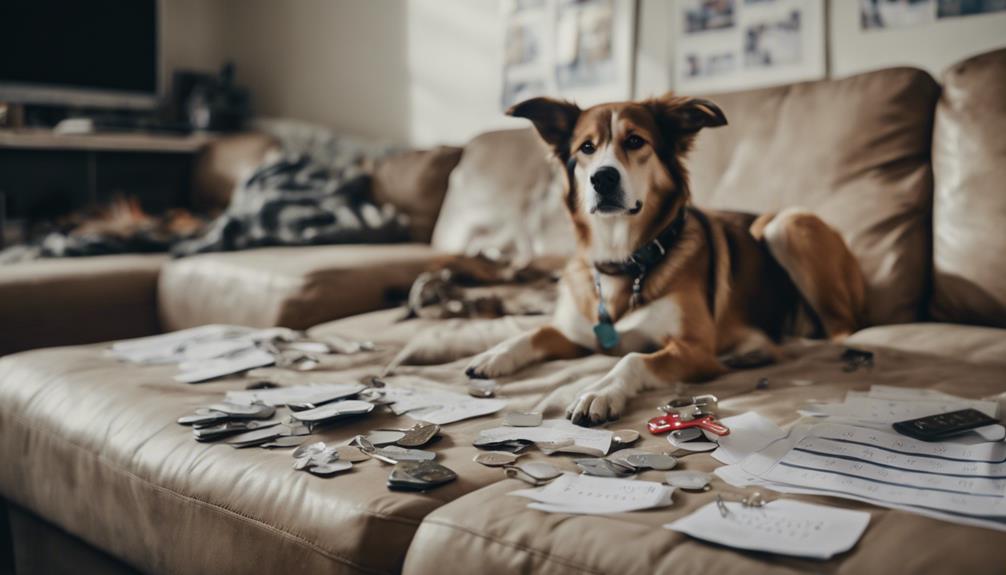You're about to navigate a legal battle to reclaim your dog from your ex. To guarantee you get your dog back, understand pet custody laws, which treat dogs as personal property. Gather evidence of ownership, such as receipts, adoption papers, and vet records. Negotiate with your ex for a mutually beneficial agreement, appealing to emotions and using persuasive communication tactics. If necessary, file a claim in small claims court or seek a writ of replevin to reclaim your dog. By following these steps, you'll be well-prepared to make a strong case for reclaiming custody of your beloved pet; now, take the next step to secure a successful outcome.
Key Takeaways
- Negotiate with your ex-partner for a mutually beneficial agreement to avoid legal escalation and prioritize the well-being of the pet.
- Gather evidence of ownership, such as documentation and witness statements, to strengthen your claim and establish legal ownership.
- Consider mediation as a cost-effective and less adversarial way to resolve disputes and reach a customized solution that benefits both parties and the pet.
- File a claim in small claims court with thorough evidence and a clear argument to increase your chances of reclaiming your dog.
- Consult a family law attorney specializing in pet ownership disputes to guide you through the legal process and navigate complex procedures.
Understanding Pet Custody Laws
When it comes to pet custody disputes, understanding the laws that govern them is important, as they treat dogs as personal property under the law. This means that, legally, your dog is considered a possession, rather than a living being with rights.
As a result, ownership of the dog can be established through proof of purchase or other documentation. If you're facing a custody battle with your ex, it's vital to understand that joint ownership of a dog can complicate matters. In some cases, seeking a joint custody agreement may be an option, but this can be a complex and emotional process.
If you're unable to come to an agreement, filing for replevin may be necessary to reclaim ownership of the dog. It's important to be aware of the pet custody laws in your state, as they can vary significantly. By understanding these laws, you'll be better equipped to navigate the custody battle and ensure the best possible outcome for you and your dog.
Negotiation Strategies for Success

Before diving into legal battles, try negotiating with your ex-partner to reach a mutually beneficial agreement that reunites you with your dog. This approach can save time, money, and emotional energy.
To increase your chances of a successful negotiation, gather evidence of ownership, such as receipts, vet bills, and registration documents, to prove your claim to the pet. Appeal to your ex-partner's emotions by sharing heartwarming stories and pictures that highlight the strong bond you share with your dog. Use persuasive communication tactics to convince your ex-partner that returning the pet is the right decision.
If negotiations stall, consider offering compensation as a last resort. Remember, the goal is to find a mutually beneficial agreement. By doing so, you can avoid escalating the situation legally. A successful negotiation can lead to a harmonious resolution, allowing you to reunite with your beloved pet.
Mediation and Alternative Dispute Resolution
You can opt for mediation, a voluntary process where a neutral third party facilitates a mutually acceptable agreement regarding pet custody. This alternative dispute resolution method can be a cost-effective and less adversarial way to resolve disputes compared to going to court. Mediation centers can provide affordable services for couples seeking to negotiate pet custody arrangements.
| Benefits of Mediation | Description | Advantage |
|---|---|---|
| Cost-effective | Lower costs compared to court proceedings | Save money |
| Less adversarial | Reduces conflict and tension | Less stress |
| Flexible arrangements | Negotiate visitation schedules and financial responsibilities | Customized solutions |
Through mediation, you can discuss and agree on important aspects of pet care, including visitation schedules and financial responsibilities. The goal of mediation is to find compromises that prioritize the well-being of the pet while addressing both parties' concerns. By opting for mediation, you can work together with your ex to reach a mutually acceptable agreement that suits both parties and, most importantly, your beloved pet.
Gathering Evidence of Ownership

Now that you've explored alternative dispute resolution methods like mediation, it's time to focus on building a strong case by gathering evidence that proves your ownership of the dog.
This pivotal step will help you establish legal ownership and increase your chances of winning custody. Consult with an attorney specializing in pet ownership disputes to make sure you're gathering the right evidence.
Start by collecting documentation, such as adoption papers, receipts, and registration papers, to prove your ownership. Save vet bills, microchip information, and any other records that show your responsibility as a pet owner.
Additionally, gather witness statements from friends or family who can attest to your ownership. Take screenshots of text messages or emails discussing the dog's ownership, and document your daily care activities, including photos and videos with the dog.
This evidence will be essential in establishing your ownership proof and strengthening your case in the event of an ownership dispute.
Filing a Claim in Small Claims Court
Now that you've gathered evidence of ownership, it's time to take the next step: filing a claim in small claims court.
You'll need to prepare your case by gathering all relevant documents and information, and then submitting the necessary paperwork to initiate the legal process.
Filing the Claim
Filing a claim in small claims court kicks off with filling out a complaint form that details your case, which will require you to provide specific information about your dispute. This form will ask for details about the dispute, the relief you're seeking, and the legal grounds for your claim. You may want to consult with a lawyer to make certain you're filling out the form correctly.
Make sure to include all relevant details about your case, as this will be your chance to tell your side of the story.
Be clear and concise in your writing, and avoid using emotional language.
Double-check your form for accuracy and completeness before submitting it.
Once you've completed the form, you'll need to pay a filing fee, which varies by location.
After filing, the court will issue a summons to notify your ex of the lawsuit, providing them with a copy of your complaint form.
Preparation is key in small claims court, so make sure you have evidence of ownership and a clear argument to strengthen your case.
Gathering Evidence
To build a strong case in small claims court, you'll need to gather concrete evidence that supports your claim to ownership and care of your dog. As a personal property, your dog's custody is determined by the law, and evidence is essential in reclaiming your pet.
Start by collecting documents that prove ownership, such as purchase receipts, vet records, and registration papers. These documents will serve as tangible evidence of your relationship with your dog, demonstrating your role as a responsible owner.
In addition to documents, gather evidence that showcases your bond with your dog. Take pictures, videos, and write stories that highlight your daily interactions, training, and care for your pet. This will help establish your emotional connection and commitment to your dog's well-being.
Moreover, obtain witness statements from friends, family, or neighbors who can attest to your ownership and care of the dog. Organize all relevant documents and evidence in a clear and concise manner to present a strong case in small claims court.
Court Procedure
You'll need to submit a written complaint to the small claims court, detailing your ownership of the dog and the circumstances surrounding the dispute. This is an essential step in getting your dog back from your ex. Small claims court is a cost-effective way to resolve disputes, and you can represent yourself without a lawyer.
To start, you'll need to fill out the court-provided forms, pay a small filing fee, and serve your ex with a copy of the complaint.
When preparing your case, keep in mind that the court will consider:
- Evidence of ownership, such as registration, vaccination records, and proof of purchase
- Evidence of care, including photos, vet bills, and witness statements
- Evidence of emotional attachment, like photos, videos, and testimonials from friends and family
Seeking a Writ of Replevin

When negotiations with your ex have reached a stalemate, seeking a writ of replevin can be a decisive next step in reclaiming your dog.
Obtaining a writ of replevin is crucial in reclaiming personal property, such as your dog, wrongfully held by another person. To secure a writ of replevin, you must demonstrate lawful ownership of the dog through evidence like purchase receipts, vet records, or registration documents.
You'll need to file a petition with the court, providing evidence to support your claim. Once granted, a writ of replevin authorizes law enforcement to seize the dog from the person wrongfully holding it and return it to you.
This legal tool can compel the return of your dog if negotiations and other methods have been unsuccessful. By seeking a writ of replevin, you can take a proactive step towards getting your dog back.
Keep in mind that this legal process requires court authorization, so be prepared to provide thorough evidence of ownership.
Impact of PFA Orders on Pet Custody

While seeking a writ of replevin can be an effective way to reclaim your dog, it's equally important to understand how PFA orders can impact pet custody arrangements, potentially restricting your access to your dog. PFA orders may restrict contact with your dog, affecting custody arrangements and limiting your ability to see or care for your pet.
In Pennsylvania, understanding the significance of a PFA order is vital in pet custody disputes, as it can give the person with possession of the dog an advantage.
- PFA orders can restrict contact with your dog, affecting custody arrangements.
- The person with possession of the dog due to a PFA order may have an advantage.
- Legal advice from a family law attorney in Pennsylvania is recommended to navigate PFA orders in pet custody cases.
Additionally, documentation supporting ownership claims becomes essential when PFA orders impact pet custody. Seeking legal advice from a family law attorney in Pennsylvania can help you navigate these complex issues and work towards a favorable outcome for you and your dog.
Working With a Family Law Attorney

Consult a family law attorney to guide you through the complexities of pet custody disputes and make certain you're taking the right steps to reclaim your dog from your ex. A family law attorney specializes in legal matters related to family relationships, including pet custody disputes. They can provide guidance on the legal process, your rights, and options available in pet custody battles.
With their expertise, they can help navigate complex legal procedures and advocate for your rights in court. They've the knowledge and experience to assist in negotiating agreements and representing your interests in legal proceedings. By consulting with a family law attorney, you'll gain a deeper understanding of the legal implications and strategies for reclaiming custody of your dog.
They'll help you explore your options, weigh the pros and cons of each approach, and develop a tailored plan to reclaim custody. By working with a family law attorney, you'll be well-equipped to navigate the legal system and increase your chances of successfully reclaiming your dog from your ex.
Preparing for a Court Hearing

As you prepare to present your case in court, gathering concrete evidence of your dog's ownership and care is vital to building a strong argument for reclaiming custody.
You'll need to collect relevant evidence, including:
- Ownership documentation, such as receipts, registration papers, and vet records
- Care responsibilities, including feeding, grooming, and medical care
- Records of your relationship with the dog, including daily routines, training, and emotional bond
It's also essential to familiarize yourself with the legal procedures and requirements for a court hearing in your jurisdiction.
Consult with a family law attorney to understand the specific laws and regulations that apply to pet custody cases in your area. They can guide you through the process and help you prepare for the court hearing.
Frequently Asked Questions
How Can I Legally Get My Dog Back From My Ex?
You'll need to negotiate with your ex, providing ownership evidence and appealing to emotions. If that fails, report your dog as stolen to the police, and as a last resort, file a small claims court case with solid evidence.
What if Someone Won't Give My Dog Back?
If someone won't give your dog back, you'll need to take action – don't wait! Start by gathering evidence and appealing to their emotions, then escalate the situation by reporting your dog as stolen to the police.
Who Has Rights to a Dog in a Breakup?
When you're in a breakup, figuring out who gets the dog can be tough. Typically, ownership is determined by proof of purchase, registration, and care – so gather those documents to establish your rights.
Can My Ex Come Take My Dog?
You're holding onto your dog's leash, trying not to let go, but wondering if your ex can swoop in and snatch them away. Rest assured, without your permission, they can't take your dog if you can prove ownership through receipts, registration, or vet records.
Can Reconciliation with My Ex-Wife Affect the Custody of Our Dog?
When it comes to navigating custody arrangements for a pet after reconciling with an ex-wife, it’s important to consider the well-being of the dog. Utilizing effective reconcile with ex-wife techniques can help create a positive co-parenting dynamic, which can in turn influence the custody arrangements for the beloved pet.
Conclusion
You've made it through the battle – now it's time to bring your furry friend home. Remember, pet custody disputes can be emotional, but staying calm and focused on the facts will increase your chances of success.
Don't be discouraged if your ex tries to manipulate your emotions; stay strong, and remember that you're fighting for what's rightfully yours.
With the right strategy and evidence, you can reunite with your beloved pet and start rebuilding your life.










